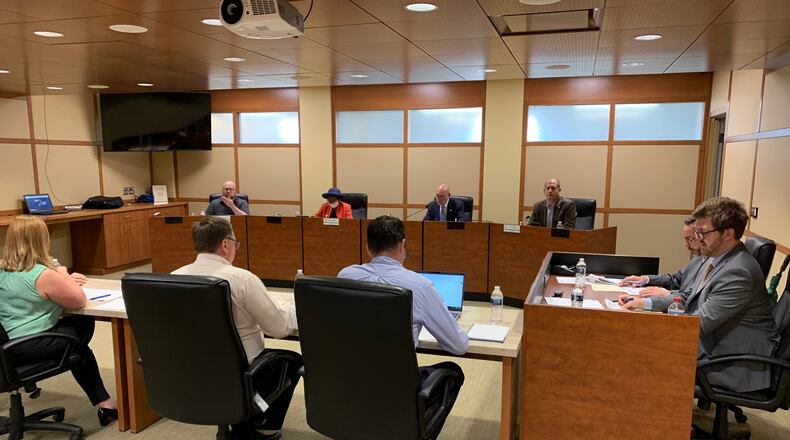Rezabek said in a Wednesday elections board meeting that he and Greathouse had agreed not to accept Jackson’s petition. But on May 23 he left early to take the afternoon off and Greathouse accepted it and accompanying fees.
At that time, the primary election for statehouse seats was in limbo until a federal court on May 27 ordered the state to hold the primary Aug. 2.
Jackson is one of six Democrats in three counties who filed jointly on June 1 seeking an order from the Ohio Supreme Court overturning a directive from the Secretary of State telling election boards to only accept candidate petitions filed by the original February deadline.
Since that deadline, the primary was pushed back to Aug. 2 and districts were redrawn. Boundaries of Plummer’s previously Republican-leaning House seat were moved to take in Democratic areas like Trotwood, making it marginally Democratic leaning.
The Supreme Court filing argues candidates should be accepted if they filed by May 4 for a regular candidacy or 4 p.m. May 23 for a write-in candidacy. Jackson’s filing was timestamped 3:48 p.m. May 23.
The Montgomery County Board of Elections on Wednesday went into several lengthy closed-door executive session meetings to discuss “personnel” and “legal” matters related to this issue.
Before that, they discussed some of what happened in the public meeting. Rezabek said someone originally tried to file a candidacy for Jackson on May 19, but Rezabek said he and Greathouse agreed they weren’t accepting filings for statehouse seat because no election was scheduled at that time.
“We were quite clear to the staff, up front, that we were not to accept this at all,” Rezabek said. “(Greathouse) indicated to me that she did not know why she did it, that she had screwed up. She indicated that she had made bad decisions lately and she just needed a break.”
Rezabek said that “a number of incidents like this” led to him directing staff not to accept or sign anything without him signing off on it.
Asked by Board of Elections member Erik Blaine if any of that was false, Greathouse responded, “No.”
Blaine made a motion to officially not accept Jackson’s filing, which led to a dispute about whether to go into executive session before voting on it. The vote to not accept the filing came down on party lines with Democrat Rhine McLin abstaining, the other Democrat voting “no” and Blaine and the other Republican voting “yes.”
After the executive session, the board convened without taking any additional action. Greathouse declined to comment. Asked by the Dayton Daily News if Greathouse’s decision to accept Jackson’s filing was related to the lawsuit, McLin, the board chairwoman, said: “To the best of my knowledge it was a mistake.”
If the state Supreme Court allows Jackson to run as a write-in for the 39th District, she is guaranteed to win the Democratic nomination for the general election because no other Democrats filed for the seat.
A candidate could still file to run in the general election as an independent by the Aug. 1 deadline, but they would run without a party label.
Jackson ran against Plummer in 2020 and lost, getting 35% of the vote. The district at that time leaned 58.7% Republican to 39% Democrat, according to Dave’s Redistricting, a website that uses composite election results to estimate partisan lean. The newly redrawn district now leans 50.1% Democratic to 47.9% Republican, according to that analysis.
About the Author

